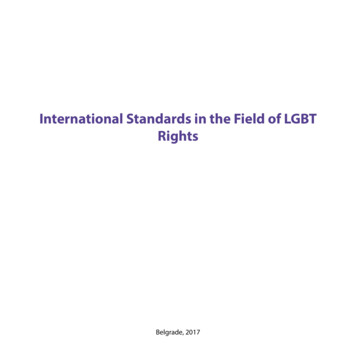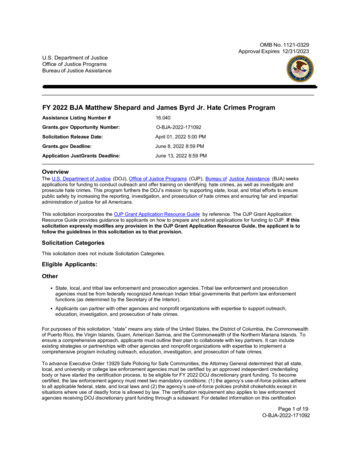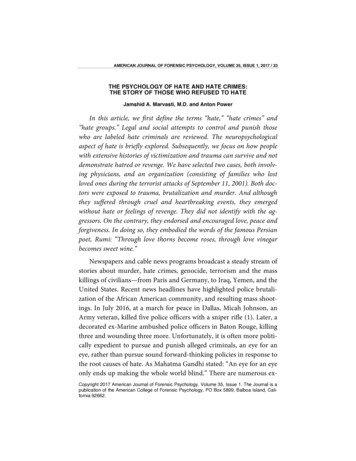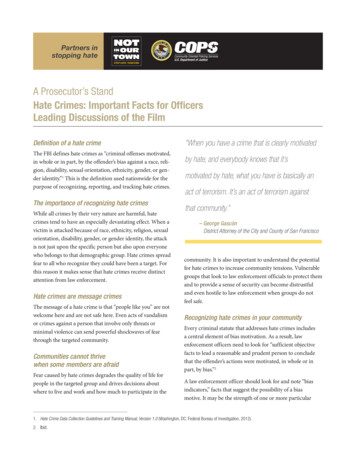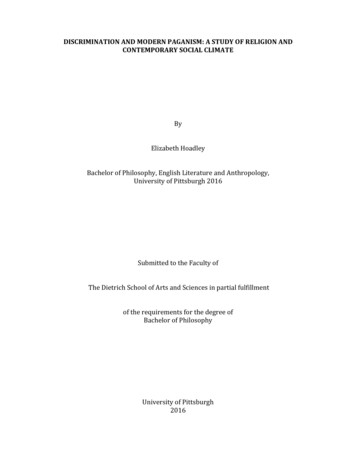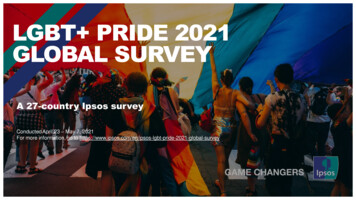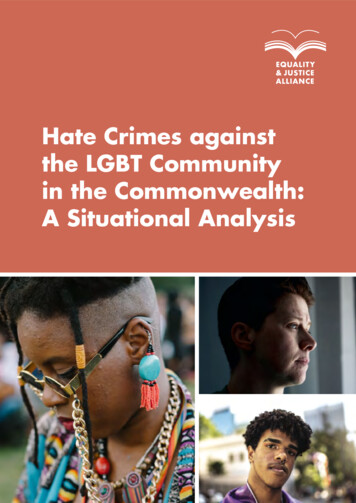
Transcription
Hate Crimes againstthe LGBT Communityin the Commonwealth:A Situational Analysis1
AcknowledgementsThe Human Dignity Trust, on behalf of the Equality& Justice Alliance, expresses its gratitude to theauthors of this report, Eric Gitari and MarkWalters, as well as the UK Government whoprovided funding for this report in support ofthe commitments made during CHOGM 2018.Editorial oversight was provided by Téa Braun,Director of the Human Dignity Trust, and GraziaCareccia, Programme Manager at the Trust, withsupport from Elliot Hatt, Programme Officer.Proofreading: Walter LeggettDesign: Lucia RusinakovaCopyright Human Dignity Trust, March 2020.All rights reservedThis work can be copied, shared anddistributed, in whole or in part, for research,educational and public policy purposes subjectto the condition that the work is not alteredor adapted and the Human Dignity Trust onbehalf of the Equality & Justice Alliance isacknowledged as author of the work.This work has been commissioned by the HumanDignity Trust, a member of the Equality & JusticeAlliance, but it has not been approved by, andnor does it necessarily represent the opinions of,any other member of the Alliance.ISBN 978-1-913173-24-1About the Human Dignity TrustThe Human Dignity Trust works with lesbian, gay,bisexual and transgender (LGBT) activists aroundthe world to defend human rights in countrieswhere private consensual sexual activitybetween adults of the same sex is criminalised.In collaboration with local partners and lawyers,we support strategic litigation to challenge lawsthat persecute people on the basis of their sexualorientation and/or gender identity.For more information, visit:https://www.humandignitytrust.org/Read more of our reports and other resources /Contact: 44 (0)20 7419 3770administrator@humandignitytrust.orgFollow us:Twitter @HumanDignityTFacebook @humandignitytrustInstagram @humandignitytrustThe Human Dignity Trust is a registered charity,no. 1158093About the Equality& Justice AllianceThe Equality & Justice Alliance is a consortiumof international organisations with expertise inadvancing equality, addressing the structuralcauses of discrimination and violence, andincreasing protection to enable strong andfair societies for all Commonwealth citizens,regardless of gender, sex, sexual orientation, orgender identity and expression.The Alliance was formed following theCommonwealth Heads of Government Meetingin London in April 2018, during which then UKPrime Minister Theresa May announced that, asChair-in-Office of the Commonwealth, the UKwould support Commonwealth governments thatwant to reform their laws that discriminate againstwomen and girls, and lesbian, gay, bisexual andtransgender people, many of which are a coloniallegacy. The Equality & Justice Alliance was formedto provide this support during the two-year period2018-2020, with funding from the UK Foreignand Commonwealth Office, in support of thecommitments made during CHOGM 2018.We also provide technical legal assistanceon request to governments seeking to reformoutdated sexual offences laws and enactprotective legislation, to bring domestic lawsinto compliance with international humanrights standards.Hate Crimes against the LGBT Community in the Commonwealth: A Situational Analysis
Hate Crimes againstthe LGBT Communityin the Commonwealth:A Situational Analysis
ContentsNOTE ON AUTHORS4GLOSSARY6INTRODUCTION8SECTION 1: SCOPE OF THE ions14SECTION 2: THE EXTENT AND NATURE OF ANTI-LGBT HATE CRIMESIN COMMONWEALTH COUNTRIES16A global trend17Anti-LGBT hate crime in Europe: Focus on the United Kingdom17Anti-LGBT hate crime in the Americas and the Caribbean21Anti-LGBT hate crime in Africa24Anti-LGBT hate crime in Asia and the Pacific27Conclusion30Perpetrators31Hate Crimes against the LGBT Community in the Commonwealth: A Situational Analysis
SECTION 3: THE IMPACTS OF ANTI-LGBT HATE CRIME34Individual impacts35Hate crime as message crimes – community impacts38Social and economic harms39Societal (structural) harms40Common themes41Differences in experiences42Regional differences42Identity-based differences42SECTION 4: RECOMMENDATIONS44Enacting hate crime legislation45Establishing public policies, operational guidance and monitoring mechanisms46Decriminalisation47Identifying other measures to tackle anti-LGBT hate crime47CONCLUSION50REFERENCES533
Note on AuthorsEric Mawira Gitari is a Doctor of Juridical Science candidate at Harvard Law Schoolwhere he is researching and writing on international law and human rights, comparativeconstitutional law and transnational social networks. Eric received his LLB from theUniversity of Nairobi in 2007, and an LLM degree from Harvard University in 2018(degree waived upon admission into the SJD program).Prior to joining Harvard in 2017, Eric worked as co-founder and Executive Directorof the National Gay and Lesbian Human Rights Commission in Kenya where he ledlitigation efforts and legal aid, civic education and paralegal trainings for LGBT peoplein Kenya. He was part of the pan-Africa activists collective that engaged in backgroundresearch and advocacy towards the adoption of Resolution 275 on Protection againstViolence and other Human Rights Violations against Persons on the basis of their real orimputed Sexual Orientation or gender identity by the African Commission on Humanand Peoples’ Rights in 2014. He was also a member of the International Bar AssociationLGBT Committee (2013-2016). In 2011-2012, he worked with the Hebrew ImmigrantAid Society managing the protection and resettlement of LGBT refugees in Kenya andUganda to safer third countries. In 2010, Eric worked with the Kenya Human RightsCommission (KHRC) as an associate in charge of the LGBT programme where heco-authored a ground-breaking research report on human rights conditions of LGBTpeople in Kenya, The Outlawed Amongst Us. Prior to joining KHRC, Eric worked withthe Centre for Rights Education and Awareness as a legal assistant with survivors ofSexual and Gender Based violence in Nairobi’s Kibera slums.At Harvard, Eric has worked as an LLM Advisor with the Harvard Law SchoolGraduate Programme and as a researcher with the Harvard Law School HumanRights Programme, where he has been working with the UN Independent Experton protection against violence and discrimination based on sexual orientation andgender identity. In 2019, Eric worked with the West Africa regional office of the UNHigh Commissioner for Human Rights to monitor, promote and protect the humanrights of LGBT people in The Gambia and Senegal as a Chayes International PublicService Fellow of Harvard Law School.Hate Crimes against the LGBT Community in the Commonwealth: A Situational Analysis
Mark Walters is a Professor of Criminal Law and Criminology at the University ofSussex Law School. Mark has conducted extensive research on hate crime and itsimpacts, and on criminal justice reform, with a special emphasis on criminal lawtheory and restorative justice practice and theory. He has published 50 books, journalarticles and research reports on these topics.Mark advises on hate crime to the UK Home Office, Law Commission, MetropolitanPolice Service, and the London Mayor’s Office for Policing and Crime, as well asnumerous NGOs and civil society organisations. He has also presented researchevidence in the House of Commons (UK), the European Parliament (Brussels), andthe Oireachtas (Dublin). Most recently he has delivered lectures and training forthe United Nations’ Asia and Far East Institute for the Prevention of Crime and theTreatment of Offenders in Tokyo.Mark completed his doctorate in law (criminology) specialising in hate crime atthe Centre for Criminology, University of Oxford (2012). He has also completedan MSc in Criminology and Criminal Justice (Research Methods) at the Centre forCriminology, University of Oxford (2008), and an LLM specialising in criminal justiceat the University of New South Wales, Sydney, Australia (2006). Mark’s first degree(LLB) was completed at the University of Sussex (2002).5
GlossaryCisgender describes people with a gender identity that matches the gender that is culturallyaffiliated with the sex assigned to them at birth. It is a term often used to describe peoplewho are not transgender or gender diverse.Gender Expression refers to external manifestations of gender, expressed through one’sname, pronouns, clothing, haircut, behaviour, voice, or body characteristics. Society identifiesthese cues as masculine and feminine, although what is considered masculine and femininechanges over time and varies by culture. Typically, people seek to make their genderexpression align with their gender identity, regardless of the sex they were assigned at birth.Gender Identity refers to each person’s deeply felt internal and individual experienceof gender, which may or may not correspond with the sex assigned at birth, including thepersonal sense of the body (which may involve, if freely chosen, modification of bodilyappearance or function by medical, surgical or other means) and other expressions ofgender, including dress, speech and mannerisms.1LGBT is an acronym for Lesbian, Gay, Bisexual and Transgender.LGBTI is an acronym for Lesbian, Gay, Bisexual, Transgender, and Intersex.LGBTQI is an acronym for Lesbian, Gay, Bisexual, Transgender, Queer and Intersex.Sex describes the classification of people as male, female or intersex based on acombination of bodily characteristics, including: chromosomes, hormones, internal andexternal reproductive organs, and secondary sex characteristics. At birth, infants areassigned a sex, usually based only on the appearance of their external reproductive organs.Sex Assigned at Birth refers to the sex individuals are allocated when they are born onthe basis of the appearance of their external genitalia. A person’s assigned sex may notconform with their gender identity, which develops over time.Hate Crimes against the LGBT Community in the Commonwealth: A Situational Analysis
Sexual Orientation describes an individual’s capacity for physical, romantic and/or emotionalattraction to, and intimate and sexual relations with, individuals of a different gender or the same genderor more than one gender. Gender identity and sexual orientation are not the same. Transgender andgender diverse people’s sexual orientation is as diverse as that of cisgender people, and they may identifyas heterosexual, bisexual, gay or lesbian.Transgender is an umbrella term for people whose gender identity differs from the gender that isculturally affiliated with the sex assigned to them at birth. This includes people who present themselvesor identify differently from the cultural gender expectations of the sex assigned to them at birth, includingall of those who intend to undergo, are undergoing, or have undergone gender affirming treatments, aswell as those who will not undergo medical treatments. A person’s gender identity is independent fromtheir sexual orientation. Just as a cisgender person can be lesbian, gay, bisexual or heterosexual, so cana transgender or gender diverse person. ‘Trans’ is often used as a shorthand for transgender.1 The Yogyakarta Principles: Principles on the application of international human rights law in relation to sexual orientationand gender identity (2007). Available at /2016/08/principlesen.pdf7
IntroductionEvery year, millions of people across the Commonwealth suffer physical, sexual andpsychological abuse and violence on account of their real or perceived sexual orientation,gender identity or expression (HRC, 2018: 19). Some common examples include murders,mutilation and torture, physical and sexual assaults, threats of violence, arson, and maliciousdestruction of property. Criminal offences that are motivated by, or which demonstrate, hateor prejudice towards the victim based on the victim’s perceived sexual orientation, genderidentity or expression are called ‘hate crimes’. They are frequently perpetrated by state andnon-state actors, and have been characterised as both a local and global phenomenonthat occurs at home, in educational institutions, in public, online, as well as in national andeven international contexts (HRC, 2018).2Studies have consistently demonstrated that, compared to the general population, LGBTpeople are more likely to suffer violence in their lifetime due to their non-conformitywith established gender and sexuality norms (Blondeel et al., 2017). Many LGBTpeople continue to report that they live with a heightened risk of imminent physical andsexual violence, which harms their mental and physical health and society as a whole(Blondeel et al., 2017). In recent years, data have emerged that reveal a concerningpattern of hate crime perpetrated against LGBT people across the Commonwealththat is largely unreported, and which is often committed by state and non-state actorswith impunity. This report highlights the need for a coordinated response to tackle theproblem and its root causes.3 At the supranational level, the UN Human Rights Councilhas passed a resolution expressing grave concern about violence and discriminationbased on sexual orientation and gender identity.4 A similar resolution was adopted bythe African Commission on Human and Peoples’ Rights (ACHPR) in 2014, urging Africanstates, including Commonwealth members, to end all acts of violence based on realor perceived sexual orientation and gender identity, and to properly investigate andprosecute perpetrators.5 In 2016, the UN designated an Independent Expert on SexualOrientation and Gender Identity (‘the Independent Expert’) with the mandate of assessingthe implementation by states of existing international human rights instruments so as toovercome violence and discrimination against LGBT people, among other duties.6 SomeCommonwealth countries have also sought to tackle this growing human rights issue byenacting specific hate crime legislation.7 Hate crime legislation, when backed by policyguidance and training, can make a dramatic difference to how criminal justice systemstackle hate crimes against LGBT people (Schweppe et al., 2018). It is most effective whencombined with broader equality for LGBT people across all forms of law, including bydecriminalising consensual same-sex sexual acts and enacting anti-discrimination laws,Hate Crimes against the LGBT Community in the Commonwealth: A Situational Analysis
but can nonetheless provide enhanced protections even where this is not the case (HDT,2019a). Importantly, hate crime legislation is now a key part of many states’ toolkit inchallenging violent prejudice in society.This report outlines the nature and extent of anti-LGBT hate crimeand its impact on individuals and societies in the Commonwealth.Section 1 outlines the methodology and approach of this report, and sets out the legal andsocial context in which hate crimes are committed against LGBT people.Section 2 assesses the extent and nature of anti-LGBT hate crimes, exploring trendsacross the Commonwealth and surveying regional and country-specific case examples.Information on the perpetrators of anti-LGBT victimisation is also outlined.Section 3 examines the impacts that anti-LGBT hate crimes have on individuals, communitiesand society. Commonalities and differences in experiences across different sectors of LGBTcommunities are described.Section 4 of the report concludes with recommendations on how Commonwealth statesshould legislate against anti-LGBT hate crime, and why statutory agencies must implementmonitoring tools to ensure that anti-LGBT victimisation becomes visible and is measured.This report should be read in conjunction with a complementarypublication by the Human Dignity Trust, Legislating to Address HateCrimes against the LGBT Community in the Commonwealth (HDT,2019a), written by Kay Goodall and Mark Walters, which outlinesthe justifications for enacting hate crime legislation, and providesrecommendations for the types of law that have been evidenced asmost effective.2As emphasised by Interviewee 03.3 As emphasised by a number of our interviews and as outlined in our associated report, Human Dignity Trust,Legislating to Address Hate Crimes against the LGBT Community in the Commonwealth (2019). Available at pdf (last accessed 10 March 2020).4 United Nations Human Rights Council (2011) Human rights, sexual orientation and gender identity. HRC/RES/17/19. Geneva. Note that all members of the Commonwealth are members of the United Nations.5 Africa Commission on Human and Peoples Rights (2014). 275: Resolution on Protection against Violenceand other Human Rights Violations against Persons on the basis of their real or imputed Sexual Orientationor Gender Identity. Available at https://www.achpr.org/sessions/resolutions?id 322 (last accessedFebruary 2020).6 United Nations Human Rights Council; 2016. Protection against violence and discrimination based onsexual orientation and gender identity. A/HRC/32/L.2/Rev.1. Geneva.7 A detailed analysis of the Commonwealth countries that have enacted some form of hate crimes legislationis available in Human Dignity Trust, Legislating to Address Hate Crimes against the LGBT Community inthe Commonwealth (2019). Available at .pdf (last accessed 10 March 2020).9
Section 1:Scope of the ReportHate Crimes against the LGBT Community in the Commonwealth: A Situational Analysis
MethodologyThis report is based on desk-based research as well as outreach and six in-depthinterviews with leading experts and advisors who represent international nongovernmental organisations (NGOs) working in the field of civil liberties and LGBTrights. Handwritten notes were taken of all interviews, which were then coded 01 to06 and thematically analysed. Secondary analysis of hate crime statistics published bygovernment agencies was an important source of information; though these statisticaldata are only periodically published by a few states. Where possible, data weredisaggregated to analyse the nature of hate crime against gay men, lesbian women,and bisexual and trans people. The research also relied on publications by internationaland national NGOs, as well as media archives. Both academic peer-reviewed andgrey literature on the nature and prevalence of hate crimes towards LGBT people wereexamined. The research data relied upon in this report span a period of 11 years, from2009 to 2020. All consulted sources are listed in the bibliography.TerminologyThe definition and conceptualisation of sexual orientation, gender identity and genderexpression are an ongoing and fluid process. Common terminology is influencedby contemporary politics and social norms, but it is also grounded in historical andreligious teachings, and, to a limited extent, in medical science. This report uses theacronym LGBT, which includes lesbian, gay, bisexual and transgender. LGBT is the mostwidely used acronym across the international literature, as well as within domestic andinternational institutions. We are mindful that not all sexual orientations and genderidentities necessarily fall within the LGBT acronym, and that the language used in thispublication has been developed from a mostly Western perspective. In some parts ofthis report we refer to LGBTI and LGBTQI (which includes queer and intersex) where weare referencing the work of organisations/researchers that have specifically used theseacronyms. We also occasionally use LGB when discussing sexual orientation-basedprejudice not affecting transgender people. It is our intention that the information foundin this report be inclusive of as many different sexual and gender identities as the dataanalysis allows. We acknowledge that there is still much work to be done to increaseinclusivity across sexual and gender minority groups in order to fully understand thediverse experiences of people from different societies across the Commonwealth.11
ContextThe geographic scope of this research is restricted to the Commonwealth, which isa voluntary political association of 54 sovereign states. Most of the Commonwealthcountries, with the exception of Rwanda and Mozambique, were former territories ofthe British Empire.8The data reviewed represent Commonwealth jurisdictions from Asia, Africa, theAmericas, Europe and the Pacific, with an estimated total population of 2.4 billionpeople.9 Although member countries have no legal obligations under the CommonwealthCharter, they are united by shared values of the rule of law, human rights and democracy,and a commitment to developing free and democratic societies and promoting peaceand prosperity for all Commonwealth citizens (The Commonwealth, 2013). In additionto sharing values, principles and interests, the prevailing legal system in Commonwealthcountries is the common law, and the political structure is largely based on theWestminster parliamentary model of government.While hate crime against LGBT people is not a problem that is unique to theCommonwealth, the shared legal history of many Commonwealth countries offers aframework to analyse its prevalence, nature and impacts. In particular, the widespreadcriminalisation of private consensual same-sex sexual intimacy and expression betweenadults in Commonwealth countries forms much of the backdrop for this analysis.These penal provisions were largely introduced by colonial administrators, and, uponachieving independence, many Commonwealth countries retained their colonial-erapenal codes and laws (see, for example, HRW, 2008; HDT, 2019b). As of March2020, 35 of the 54 member states of the Commonwealth continue to criminalise privatesexual acts between consenting adults of the same sex, and certain forms of sexual andgender expression.10 Furthermore, 17 Commonwealth states specifically criminalisesame-sex sexual conduct between females.11 Maximum punishments can be severe,though the implementation of these laws varies between member states. In Bangladesh,Barbados, The Gambia, Guyana, Sierra Leone, Tanzania, Uganda and Zambia,consensual same-sex sexual conduct is penalised with up to a maximum sentence of lifeimprisonment (HDT, n.d.), while the death penalty is legally prescribed in Brunei and thenorthern states of Nigeria. Any form of sexual intercourse (including same-sex) outsidemarriage is punishable by death in Pakistan.12Transgender and gender diverse people are also directly and indirectly criminalisedin many Commonwealth countries. In addition to often being subject to the laws thatprohibit private consensual same-sex sexual intimacy, transgender and gender diversepeople are also criminalised by laws that regulate their gender expression (through socalled ‘cross-dressing’ or ‘impersonation’ laws) and the misuse of public order, vagrancyand misdemeanour offences (HDT, 2019b). These laws are broad and are often usedin conjunction with one another, not only to arrest and detain trans and gender diversepeople, but to limit their access to rights and justice, and to otherwise control and punishthem (HDT, 2019b).Hate Crimes against the LGBT Community in the Commonwealth: A Situational Analysis
These laws are both a product of, and a contributory factor to, widespread prejudice,discrimination, stigma and violence against LGBT people. Laws that criminalise LGBTpeople put them beyond the protection of the law, fostering a climate of state-sanctionedfear, discrimination, violence and abuse. Wherever there is criminalisation, LGBT peopleface police and state harassment, blackmail and extortion, and exclusion from vitalservices, such as health, education, housing and employment. Criminalisation thereforecreates obstacles to governments fulfilling their responsibilities to their citizenry, includingsecuring public health and achieving economic development (HDT, 2015). Because ofthis, LGBT people are dissuaded from openly revealing their sexual orientation, genderidentities and/or presenting their gender expression. This further serves to create barriersto accessing basic civil rights such as education, employment, housing and health. Indeed,there is a well-evidenced correlation between criminalisation and the failure of democracyand the rule of law, and restrictions on broader human rights (HDT, 2015).The Commonwealth’s legal history of imposing moral values and gender inequalityis seen as one of the factors that has created the climate that persists today. Postcolonial theorists have demonstrated that the colonial project of criminalising sexualand gender variance sought to standardise and erase divergent sexualities, genderidentities, spiritualities and cultures in line with Victorian moral values for reasons ofpolitical expediency (Tamale, 2014). The result was that such criminalisation reinforced,and sometimes introduced, gender and sexual hierarchies in colonised societies, andinstitutionalised bias and stigma towards LGBT communities.Old and new laws that criminalise same-sex intimacy and gender nonconformity domore than outlaw certain sexual acts or gender expressions – they effectively preventLGBT people from expressing their identity. Such laws help to foster a social climate thatpromotes rigid gender norms and gender inequalities (Jewkes et al., 2015). Those who falloutside of these expected norms and ‘ways of being’ are not only resisted by the law, theyare also likely to be subjected to acts of targeted interpersonal violence. A legal culturethat excludes LGBT people from the protections of the law also creates a culture of impunitywhere violence towards LGBT people goes unchallenged. In this context, bias- and hatemotivated violence and abuse are tools used by both state and non-state actors to controland punish the transgression of established sexual and gender norms (Perry, 2001).Three of our expert interviewees emphasised that there was a direct correlation betweenrecent increases in anti-LGBT hate crimes and the rise of ultraconservative political andreligious leaders who persecute, dehumanise and denounce LGBT people (Interviewees01, 02 and 03; see also HRC, 2018: para 38).13 A stark example of such persecutionwas evident in The Gambia under the Presidency of Yahya Jammeh. In 2008, the formerPresident gave LGBT people a 24-hour ultimatum to leave the country, or he would cut offtheir heads (BBC, 2008). In 2014, he called LGBT people “vermin” and said he woulddeal with them in the same way he deals with mosquitoes which carry malaria (HRW,2015). Rhetoric used against LGBT people is often intertwined with religious dogmaand interpretations of the Bible, sharia, and other religious texts. In some cases, politicalleaders even deny the existence of LGBT people and anti-LGBT hate crimes in theircountries altogether (HRC, 2018: para 62). This form of denial and negation works toencourage perpetrators to continue engaging in hate crimes without legal consequence.13
The media have also played a significant role in disseminating and amplifyingderogatory and prejudicial messages about LGBT people (Civil Society Coalition etal., 2014; Tomlinson, 2017). This is often connected with online hate speech and thespreading of fake news and propaganda particularly targeted towards minorities. Evenin countries where there is a pro-LGBT human rights legislative framework, there havebeen increases in negative rhetoric towards LGBT people and other minority groups.In the UK, data from the Crime Survey for England and Wales (CSEW) showed thatthere had been an increase in anti-LGBT hate crimes of 11 per cent between 2016 – theyear the public voted to leave the European Union – and 2018 (Walters, 2019). Datafrom the British Social Attitudes (BSA) survey also showed that the proportion of peoplewho say they are completely comfortable with same-sex sexual relations fell for the firsttime in more than three decades, dropping from 68 per cent in 2017 to 66 per centin 2018 (Walters, 2019). These increases in anti-LGBT hostilities have come at a timeof widespread coverage of anti-LGBT protests outside schools that teach LGBT equality,and where politicians have outwardly supported protestors.As will be demonstrated in this report, the widespread problem of hate crimesagainst LGBT people, and the failure of many Commonwealth countries to addressit, raises concerns about states’ compliance with international law. All members ofthe Commonwealth are UN members and have ratified international human rightsinstruments. Jurisprudence from international human rights bodies has clarifiedthat human rights are universal and apply equally to all.14 States bear the primaryobligation and responsibility to respect and protect the human rights of all peopleunder their jurisdiction equally. In this regard, we reiterate that this report should beread in conjunction with our linked report Legislating to Address Hate Crimes againstthe LGBT Community in the Commonwealth (HDT, 2019a).LimitationsVery few Commonwealth member states record and publish hate crime statistics.With the exception of the UK, the Isle of Man, Canada and, to a lesser extent, SouthAfrica, state-level data on hate crime are almost entirely lacking within Commonwealthjurisdictions.15 In other words, there is a major gap in data collection, which hasinevitably placed constraints on the coverage of this report. The lack of data is due inpart to a reluctance of victims to report anti-LGBT hate crime to the police for a variety ofreasons, including criminalisation and the culture of discrimination and stigma againstLGBT communities,16 but is also a
theory and restorative justice practice and theory. He has published 50 books, journal articles and research reports on these topics. Mark advises on hate crime to the UK Home Office, Law Commission, Metropolitan Police Service, and the London Mayor's Office for Policing and Crime, as well as numerous NGOs and civil society organisations.



